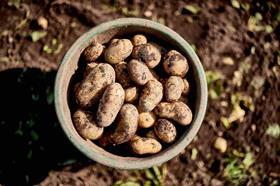
A report by food waste charity Wrap into the financial implications for farms of reducing food surplus and waste has shown that the average farm could boost its profits by 22 per cent with better data collection and management of food waste.
The analysis was developed by Wrap and agri-food consultants Birnie Consultancy, with the support of the College of Agriculture Food & Rural Enterprise (CAFRE) and the Northern Ireland Department for Agriculture, Environment & Rural Affairs (DAERA).
Five farm businesses were modelled: apples, strawberries, potatoes, carrots and eggs. The models were built to consider “input costs, product prices, contracting costs, likely product yields and percentage of food surplus and waste”.
“Across the farmers contacted during this project, data collection on food surplus and waste at primary production levels was negligible,” the report revealed. “However, engagement with farmers and sector specialists has raised the profile of data collection.”
A key output from the modelling was the prediction of Realistic Profit Gain, showing the potential profit gains a farm enterprise could make following strategic intervention.
The report found that better recording of waste and food surplus could lead to a realistic profit gain of 15 per cent for apple growers, 19 per cent for strawberry growers, 23 per cent for potato growers and 33 per cent for carrot growers.
“Feedback from producers was positive about collecting data on food surplus and waste, provided that they could see a potential benefit,” the report stated. “Effective use of the models will demonstrate benefit and is likely to increase the control of surplus and waste on-farm.
“Many producers are keen to collect data but feel that the task itself is onerous. A simple platform to facilitate simple data collection around food surplus and waste would encourage more participation.”



